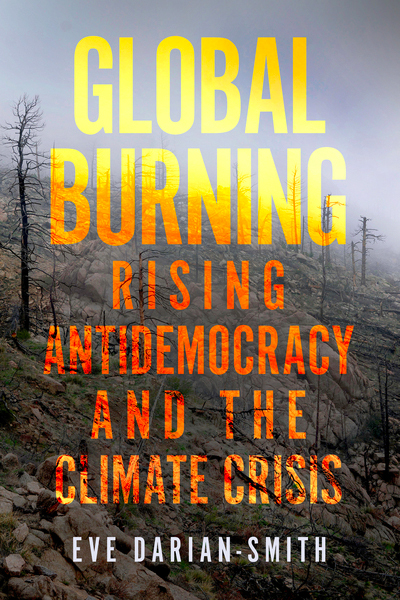
Global Burning: Rising Antidemocracy and the Climate Crisis
 What role are economic decisions and partisan politics playing in the mounting global
climate crisis? In Global Burning: Rising Antidemocracy and the Climate Crisis, UCI global and international studies professor and chair Eve Darian-Smith draws stark
connections between extractive capitalism, ultranationalism and catastrophic wildfires
that have scorched three countries on three different continents. The resulting devastation
and on-going contributions to climate change, she argues, are a global crisis that
calls for a new political, economic and moral framework that prioritizes people over
profits and a global view that blurs boundaries between lands, seas and atmospheres.
Below, Darian-Smith explains the need to view this issue with a global lens, beginning
with the way we think about and through wildfires. View as video at https://youtu.be/r8rNxXTJJjw.
What role are economic decisions and partisan politics playing in the mounting global
climate crisis? In Global Burning: Rising Antidemocracy and the Climate Crisis, UCI global and international studies professor and chair Eve Darian-Smith draws stark
connections between extractive capitalism, ultranationalism and catastrophic wildfires
that have scorched three countries on three different continents. The resulting devastation
and on-going contributions to climate change, she argues, are a global crisis that
calls for a new political, economic and moral framework that prioritizes people over
profits and a global view that blurs boundaries between lands, seas and atmospheres.
Below, Darian-Smith explains the need to view this issue with a global lens, beginning
with the way we think about and through wildfires. View as video at https://youtu.be/r8rNxXTJJjw.
Your book links direct political actions with climate outcomes and costs through three of the nations hit hardest by increasing wildfire activity and intensity. Connect the dots for us and similarities across the nations you studied.
My book explores the causes and consequences of catastrophic wildfires that have been burning in both the northern and southern hemispheres between 2018 and 2021. I use catastrophic fires as a lens through which to explore the bigger issue of climate change, that includes a range of issues such as toxic pollution, megadroughts, rising seas, and the massive destruction of biodiversity around the world. The Australian fires—and those faced in the Amazon, California, and other parts of the world—can be interpreted as an omen of ecological collapse as temperatures rise, glaciers melt, and oceans warm. In the words of Greta Thunberg, the young Swedish environmental activist and a global leader on fighting climate change, “our house is on fire.”
Out-of-control fires burning around the world are rising in frequency and intensity each year. How and why is this happening? The scientific answer is that this is a result of escalating greenhouse-gas emissions. But this process didn’t just happen on its own – it is not some inevitable scenario. I argue that we must connect climate crises to politics and economics. This means that the upswing in catastrophic wildfires need to be linked to extractive capitalism – mining, deforestation, agrobusiness and so on. But I also argue – and this is the contribution of my work – that catastrophic fires are connected to ultranationalist, antidemocratic, extreme right leaders that are taking hold of governments around the world. This wave of leaders ignore, deny, excuse, and in some cases actively encourage the burning of animals, people, and unique ecological systems in the name of economic progress, and they include Boris Johnson (Britain), Vladimir Putin (Russia), Matteo Salvini (Italy), Jair Bolsonaro (Brazil), Recep Erdoğan (Turkey), Rodrigo Duterte (Philippines), Jarosław Kaczyński (Poland), Narendra Modi (India), Daniel Ortega (Nicaragua), and many more. We also have to include Donald Trump in this list, who rolled back 50 years of environmental protection laws when president and continues to push the Republican Party’s antidemocratic and anti-environment agenda from behind the scenes.
I focus on fires that burned in three countries on three different continents. I could have picked other places, given that there is no shortage of massive fires burning around the world. But I chose bushfires burning in Brazil, Australia, and California in the US because of the scale of their devastation, and because they share certain common features in terms of why they occurred, who they impact most, and what they suggest about a global pattern of devastating firestorms and the political conditions that foster them. Importantly, all three countries claim to be liberal democratic societies, with Brazil and the US being two of the biggest democracies in the world in terms of population.
The United States, Brazil, and Australia are ranked as among the richest countries in the world (the US is ranked number 1, Brazil as number 9, and Australia as number 14). And so it is reasonable to expect that their governments could provide adequate firefighting equipment and resources to stop widespread death and destruction. However, this is not the case. Millions of acres of bushland have burned, billions of animals have been incinerated, and untold numbers of human lives lost. Notably, between 2018 and 2020 these three countries were led by pro-business political leaders—Trump, Bolsonaro and Morrison —who were elected to power on ultranationalist policies that lean heavily toward being antidemocratic and authoritarian. Interestingly, all three leaders are skeptical of climate-change science, calling it a hoax promoted by environmental activists, scientists, and academics.
We urgently need to ask what are the connections between catastrophic fires and these radically conservative governments that explicitly prioritize corporate interests over ordinary citizens? Why did these leaders blatantly block, disregard, or dismantle environmental protection laws and the regulatory agencies that enforce them? And why is this happening when consensus on climate science is almost universal, and most people around the world understand that humanity is facing some form of ecological collapse?
If political action is the catalyst for change but also a big part of the problem due to our increasingly polarized world, how do you see people coming together to create a collective solution?
Turning around the escalating climate crisis requires enormous efforts by everyone. But it is especially important that those wielding global power, such as the political leaders of rich carbon-emitting countries, take a leadership role. However, what we are witnessing is just the opposite. Despite the optimism surrounding the Paris Agreement that was signed by 197 countries in 2015 pledging commitments to reducing greenhouse-gas emissions, and the recent affirmation of these commitments at the COP26 meeting in November 2021, little has been achieved on a global scale.
Under the Trump administration, the US withdrew from the Paris Agreement in 2017 and opened public lands to mining, deforestation, and mineral extraction. In 2021 President Biden reversed this trend and rejoined the Paris Agreement and declared a series of executive orders designed to tackle climate change. But it remains unclear what difference Biden’s plans will make, especially if the Republican party regains control in the 2024 election.
Other big carbon-emitting countries simply ignore their internationally pledged obligations. The result is that policies by far-right leaders in Brazil, Australia, and (until recently) the US are lining up with similar policies implemented by other extreme right governments to effectively form a global blockade against those fighting fires and climate change more generally. What these leaders share is a deep dependency on corporations that fund their political campaigns and help establish and maintain their political power.
I call the collusion between political governance and corporate sectors free-market authoritarianism. This term underscores the common antidemocratic agenda of opportunistic political leaders and the profit logic of corporations. This collusion has been building worldwide over decades, promoted and fostered by neoliberal laws and policies implemented through practices such as voter suppression, spreading disinformation, extending term limits, and militarized responses to public protest. The result is the undermining of ordinary people’s ability to fight back against big business and the concentration of wealth and power in the hands of a few.
Against this front, the environmental justice movement is building across regions, continents, and cultures. Emerging most forcefully from the global south, where the impacts of climate change are disproportionately experienced, the environmental justice movement reflects a loose coalition of activist networks representing tens of thousands of grassroots communities, many of these Indigenous groups and small farmers. Uniting the movement are calls to change people’s cultural values and the ways they relate to each other and the natural world. Many in the environmental justice movement appreciate that how we treat animals, forests, and oceans is profoundly connected to how we treat one another. Perhaps most significantly, green activists promote a different set of ethics than that held by far-right leaders and corporations. Putting it simply, environmental justice groups are calling for a new political, economic, and moral framework that prioritizes people and natural worlds over profits.
Explain the importance of looking at this issue with a global lens.
Analyzing wildfires through a global lens is essential because fires and toxic smoke are not contained by national borders. Satellite images show smoke from the Brazilian fires in 2020 blanketing South America and rising high into the atmosphere, to be seen from outer space. Similarly, raging wildfires across the Arctic region in 2021 sent smoke across the northern hemisphere into Canada and North America.
This is why my book urges us to think with and through fires. By this I mean that we need to move beyond our conventional nation-bound worldview. Conceptualizing fires as inter-continental phenomena blurs boundaries between lands, seas, and atmospheres. It underscores the need to connect what is happening in local communities coping with fire on the ground to global forces beyond what most of us can recognize or even understand. Conceptually and practically, this means we must connect the global political economy – and its relentless drive for profit – with what is happening to ordinary people as they wake up in the morning breathing thick smoke and listening fearfully for evacuation warnings.
Perhaps most profoundly, a global lens underscores the need for scholarly approaches that appreciate how fires affect all societies, be they in the global south or the global north. This calls for new modes of analysis that take seriously scholarship and perspectives beyond the Euro-American academy or have been historically silenced within it. And it also calls for a new kind of global consciousness that pushes back against the dominant individualism and selfish nationalism of our modern era and recognizes humanity’s collective planetary future.




connect with us